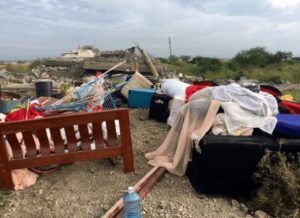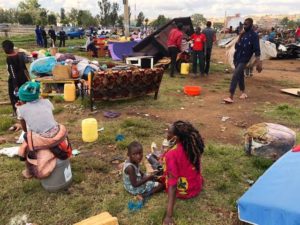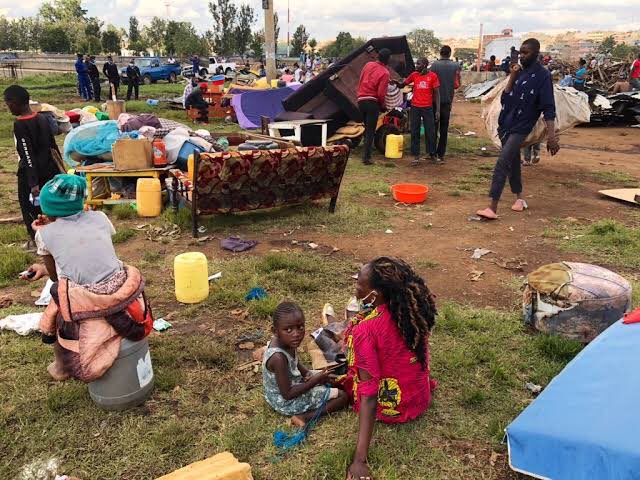By Roseleen Nzioka
Nairobi, Kenya: On the morning of May 4th, Kenya woke up to the shocking news of the eviction of around 8,000 people from their homes in Kariobangi, Nairobi.
On May 15, a further 1,500 people were forced out of their homes in Ruai on the outskirts of Nairobi. Despite the Covid-19 induced night curfew in the country, the Ruai eviction happened at night, during curfew hours and in heavy rainfall. Both Kariobangi and Ruai are informal settlements.
The government justified the Ruai evictions by stating that the residents had encroached on its 3000-acre piece of land which had long been set aside for the expansion of the Dandora Sewerage Treatment Plant.
Local media reports show that the affected families were not provided with alternative shelter and have been sleeping out in the cold since then, some with very young children.
In the Kariobangi case, evictions were carried out despite a court order issued the day before restraining authorities from conducting the eviction. The evictees instantly became homeless as their houses were flattened with bulldozers.
 According to a report by the United Nations Human Rights Office of the High Commissioner, the Kenyan Government had only notified the evictees verbally 24 to 48 hours in advance and had not taken any measure to provide them with food, temporary shelter, access to water and sanitation or any type of compensation. Thousands of people are currently homeless and in need of urgent assistance.
According to a report by the United Nations Human Rights Office of the High Commissioner, the Kenyan Government had only notified the evictees verbally 24 to 48 hours in advance and had not taken any measure to provide them with food, temporary shelter, access to water and sanitation or any type of compensation. Thousands of people are currently homeless and in need of urgent assistance.
It is against this backdrop that the International Commission of Jurists-Kenya has called on the government to urgently review laws and policies to make them pro-poor to mitigate the dire challenges that the poor and marginalized are currently experiencing in the country.
ICJ-K recently published resolutions reached following a webinar on “The Impact of Covid-19 on the poor and vulnerable in society”. The topic of the webinar was informed by the fact that the measures taken by the government to curb the spread of Covid-19, though necessary, have posed serious socio-economic challenges for the poor, the vulnerable, and the marginalized in society.
Some of the issues discussed were: The role of the criminal justice sector in ensuring petty offenders are not exposed to Covid-19, and the justice needs of the poor and marginalized are prioritized; How the pandemic has affected the mental health of the poor and vulnerable; and The ongoing disregard of economic and social rights of the poor and vulnerable by the government in the measures it has taken to mitigate Covid-19.
Participants were drawn from civil society, the private sector, and the government. In a communique released after the webinar, ICJ-Kenya made strong and urgent recommendations to the government to stop all demolitions in the country and instead allow for dialogue between parties to ensure that Kenyans are not rendered homeless and exposed to Covid-19; Observe and respect the rule of law (Kariobangi case evictions were carried out despite a court order issued the day before restraining authorities from conducting the eviction).
ICJ-K urged the National Senate to invoke its oversight mandate and summon the Cabinet Secretary of the Ministry of Interior and Coordination of National Government to explain the demolition exercise in Ruai, Kariobangi, and other parts of the country.
ICJ-K urged the Cabinet Secretary Ministry of Labour to incorporate the use of cashless fund transfer to ensure that elderly persons who are vulnerable are able to access their monies without having to travel to banking halls and also ensure that the government stimulus package caters to persons in the formal and informal sector.
“As a Commission of Jurists, we have noted that the current package only benefits those employed in the formal sector and there is a need to review the social welfare register which is currently outdated and incorporate other classes of vulnerable persons. Provide safe houses and shelters for homeless persons who are affected by the demolitions and persons living on the streets,” said ICJ-K.
The National Police Service was urged to stop extorting, harassing, and soliciting bribes from Kenyans who are seeking legitimate access to areas that are under lockdown and to desist from detaining persons who are poor, vulnerable and marginalized.
ICJ-K said there is an urgent need for the Ministry of Health to coordinate with the police to ensure that registered health care professionals give movement passes to persons in need of medical attention.
 ICJ Kenya in their communique said it is committed and undertakes to continuously assess the impact of the COVID-19 pandemic on the enjoyment of fundamental human rights and freedoms with a view to ensuring that the highest protection of these rights is guaranteed and offered during the pandemic.
ICJ Kenya in their communique said it is committed and undertakes to continuously assess the impact of the COVID-19 pandemic on the enjoyment of fundamental human rights and freedoms with a view to ensuring that the highest protection of these rights is guaranteed and offered during the pandemic.
Continuous advocacy for decriminalization and reclassification of petty offenses; engage with the criminal justice actors to advocate for the decongestion of detention centers. Advocate for the strengthening of the legal aid service to ensure access to legal aid for the poor and the vulnerable; engage with the Legislature to ensure human rights principles are factored into the development of law and policy and advocate for legal services to be classified as essential services during this period.
Other duty bearers specifically the Judiciary, the National Council on Administration of Justice, The Senate, Ministry of Interior and Coordination of National Government, Ministry of Labour, Social Security and Service, National Police Service and the Ministry of Health were charged with ensuring that they pro-actively protect the poor and vulnerable in society taking cognizance of the psychosocial toll of COVID-19 safety measures on vulnerable Kenyans.















